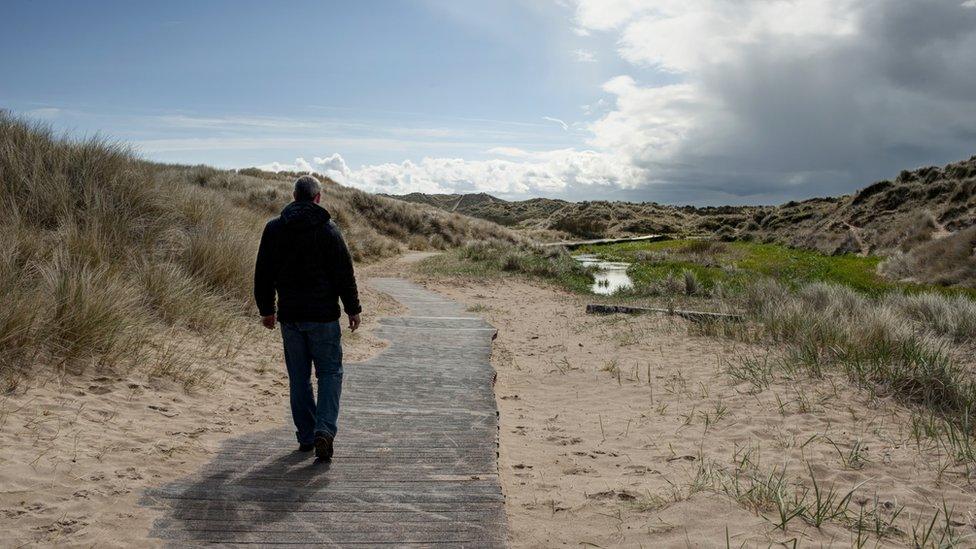Coronavirus: Pandemic has 'catastrophic' impact on families
- Published

The coronavirus pandemic has had a "catastrophic" impact on many families, a counselling charity has warned.
Relate chief executive Duane Farrell also said conflict between parents was already leading to "huge distress and mental illness" among children.
Mr Farrell said lockdown had created a "perfect storm" of difficulties.
Relate, along with the Catholic marriage guidance charity Accord, is concerned at a spike in calls as lockdown restrictions have eased.
While for some, spending months together with children has cemented their relationship, for others, "it's been a perfect storm of financial hardship, lack of work, children not at school and none of the normal support networks, and that's led to frequent, intense parental conflict".
Mr Farrell's comments were echoed by Accord which said an emergency helpline set up in early April was "inundated with calls" and that since lockdown restrictions eased, requests for face-to-face counselling have soared.
'Defensiveness, contempt, stonewalling'
Accord counsellor Dr Mary Goss, who analysed call log data from the helpline said that, generally speaking, the healthier the relationship was before lockdown "the better able the couple were to handle the additional stresses and pressures".
"The couples who weren't skilled at avoiding criticism, who tended towards defensiveness, contempt, or stonewalling, were at a massive disadvantage when it came to coping with the challenges that lockdown presented," she said.

Paul's story
Paul (not his real name), from County Londonderry, told BBC News NI he felt lockdown "accelerated" the breakdown of his marriage.
"I knew things weren't right before coronavirus, but going to work and going out for drinks with my friends and family helped me to keep my head sort of buried in the sand for years," he said.
The 36-year-old has moved out of his family home in recent weeks.
"It all came to a head in May," he said.
"I was furloughed, the kids were at home, my wife was working from home, we were all under the one roof and we ended up fighting all the time. The pressure got too much."

Although he and his wife had been to relationship counselling in the past, they both sensed "separation was coming down the line".
"Lockdown just accelerated it all - maybe by years, I don't know."
He said that being away from his children was the hardest part of separation.
"As hard as this is for both of us, I know it's worse for them."

Petitions for divorce have also increased "significantly" over the past three months, according to the chair of Northern Ireland's family law committee, Suzanne Rice.
Ms Rice said firms began to see a surge in calls from mid-April.
"Lockdown fractured so many relationships and it's very clear from the sheer volume of cases we're now dealing with as we transition out of lockdown that this has had a devastating impact on families across Northern Ireland," she said.
"Whilst life returns back to some sort of normal for us in how we shop and socialise, for many parents it feels as if their family relationships are still in lockdown as access to courts for children's matters continues to be severely restricted to urgent cases only."
Family law solicitor Sinead Larkin said her firm, Larkin Cassidy, is one of many now dealing with a backlog of cases.
"For many couples, the extended period of time at home brought into sharp focus any fault lines within the marriages", Ms Larkin said.
"In normal times, some couples paper over issues and engage in avoidance, because they go out to work, spend time apart, or are focused on rearing the children.
"What we saw was that these fractures had turned into unassailable chasms during the pandemic, because there was no escaping each other."
However, she stressed that to focus solely on the spike in the number of requests for legal assistance would be to "ignore the wider public health crisis hurtling towards us".
"We need to look beyond the headlines here - for every one of these calls to ours or other offices across Northern Ireland, there's a family broken down, parents who may experience mental health problems in the months to come and many, many children who'll be mentally and emotionally scarred by this whole experience."

Relate's Duane Farrell said the health and education system needed to be prepared for "huge problems in the autumn in terms of depression, anxiety and post-traumatic stress".
"Research has shown that the breakdown of relationships is closely linked to anxiety and depression among children," he said.
Dr Goss pointed out that children with parents who can resolve conflict "in a positive way" experience better physical and mental health, do better academically "and are much more likely to form positive relationships themselves later in life".
"Every relationship involves conflict," she said.
"You need to manage it in a way that's respectful and not destructive. Often the urge to apologise and make up is tempered by the determination not to be seen to be the one who appears weak in the relationship."
'Tidal wave'
Dr Goss said 34% of Accord helpline calls mentioned abusive behaviour in various forms.
The Men's Advisory Project (MAP), which provides counselling services for men experiencing domestic abuse, has reported a 300% increase in calls over the last three months.
Counsellor Rhonda Lusty said the organisation had been "absolutely flooded with calls".
"The amount of suffering out there is extreme and so worrying for us," she said.
"We're seeing a tidal wave of young men especially, coming to us because of abuse that has led them to believe their lives are not worthwhile."
Meanwhile, fear of being caught led to a reluctance to reach out for help among female abuse victims, according to Women's Aid, which actually saw a significant drop in referrals in March and April.
The organisation's Belfast and Lisburn chief executive officer Kelly Andrews said refuges remained open throughout lockdown, but demand fell because its restrictions "shut down routes to safety".
"When you're locked down at home with your perpetrator, you can't reach out for help, and that's what made it so worrying - home isn't a safe place for domestic abuse victims."
- Published9 May 2020
